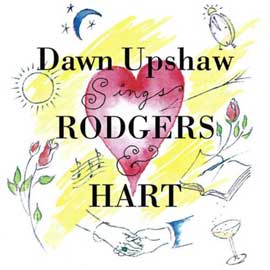Sing For Your Supper

a musical celebration of the songs of Richard Rodgers and Lorenz Hart. Concept by Richard Lewine and John Fearnley, drawn from the working scripts of productions at the Westwood Playhouse, Los Angeles and the Arlington Park Theatre.
Originally staged at the Helen Hayes Theatre on May 13th 1975 (then entitled Rodgers and Hart - A Musical Celebration)
Synopsis
Act I
On a permanent unit set, layered with steps and platforms, the company of three girls and three men opens with the rousing Jupiter Forbid! and follow with three memorable songs of love - Falling In Love With Love, Thous Swell and The girl Friendi, each illustrating one of the team's greatest song-writing qualities - romantic, sophisticated and wacky respectively. We learn about their first meeting, when 16 year-old Dick Rodgers though Larry Hart, all of 23, was the ultimate "great sophisticated old man"! A series of duets that follows generates a lot of laughs as, one after another, a boy or a girl sings to the wrong partner. The audience is carried along by such songs as My Heart Stood Still, Isn't It Romantic, Where or When and I Wish I Were In Love Again, to which the couples fox-trot in true 30s style, change partners, change again .....
The next segment features the raunchy Happy Hunting Horn (from Boys From Syracuse), Mountain Greenery, the hilarious and little-known What a Lovely Day for a Murder and Little Girl Blue. Then Rodgers and Hart's Hollywood period - complete with straw hat, make-up, whirring cameras and clapboard. A fascinating glimpse of the gradual evolution of a hit - Blue Moon - is given as we hear the melody with parts of three totally different sets of lyrics that Hart wrote and scrapped before Blue Moon arrived.
Hart's inspiration was urban - very New York, in fact - one of the show's characters says "Usually he could be found at some bar off Broadway, scribbling away. Probably on a cocktail napkin. But, ah ... the words he scribbled ...." and Broadway was what drew the two back to New York - perhaps their combined talents were a little too up-market for Tinsel Town. The first act finishes with a clutch of sings glorifying N.Y. - Way Out West (On West End Avenue, Give It Back to the Indians (which can be very effectively staged as a dance in the "Hollywood Indian" style), I Gotta Get Back to New York and perhaps the greatest of all 'city songs' - Manhattan
Act II
The second half starts with a flight departure announcement, to usher in a sequence of travel songs, from Any Old Place With You to Dear Old Syracuse, by way of a desert island, Chicago and Paris, interspersed with a vaudeville-type sequence including some typical 'I say, I say, I say' jokes. By contrast, there follow several lyrical world-weary songs, Ten Cents a Dance, Sing For Your Supper, but in general the mood is romantic and happy, as one great number after another is offered - I Didn't Know What Time It Was, You Musn't Kick It Around, Dancing On the Ceiling.
One couple now don horn-rimmed glasses, that badge of the psychiatrist's profession, and watch another couple who declare It's Got To Be Love, (It Couldn't be Tonsilitis). Their comment is He and She, during which the third couple sing Blue Room, that paean to married bliss. Then we pass through several songs of loneliness before swinging into the finale melody, to be presented as elegantly as possible - And why not, when it consists of Bewitched, I Married and Angel, The Lady Is a Tramp, Have You Met Miss Jones? and the immortal Lover.
A reprise of Jupiter Forbid! closes this celebration of an unforgettable partnership: two men, very different in their natures, but whose talents combined magically to give us so many songs that we shall always treasure.
ORCHESTRATION
No Cast Recording availableReed 1: Flute, Piccolo, Clarinet, Alto Sax
Reed 2: Clarinet, Tenor Say, Oboe, Cor
Anglais (Opt.)
Percussion
Piano
Double Bass